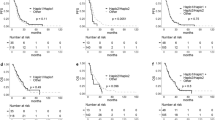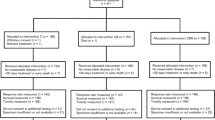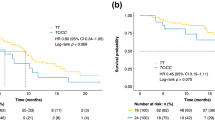Abstract
The −460T → C polymorphism of vascular endothelial growth factor (VEGF) gene significantly increases its promoter activity. A pilot study was conducted to assess the influence of this polymorphism on clinicopathological features of patients with colorectal carcinoma. In total, 228 patients were enrolled, including 100 with stage II/III colorectal carcinoma receiving curative surgery and 128 with metastatic disease. An excellent correlation in VEGF −460 genotypes based on white blood cells and tumor tissues existed, but there was no between-group difference in patients with or without colorectal carcinoma. A marked increase in intratumor and circulating VEGF levels were observed in patients with the T/C or C/C genotypes (P<0.01), which was associated with increased extent of invasion, nodal involvement, poor histological differentiation, subsequent metastasis and shorter survival in stage II/III patients treated with curative surgery (P<0.01). For patients with metastatic disease, this polymorphism was associated with a lower response rate to FOLFOX-4 (P=0.03) and shorter survival (P<0.001). By multivariate analysis, this polymorphism was identified as an independent prognostic factor (P=0.01). These data suggest that −460T → C polymorphism of VEGF gene, by increasing VEGF expression and subsequent angiogenesis, could be a key determinant for increased tumor recurrence and a poor prognosis of patients with colorectal carcinoma. However, this study is exploratory and is not adjusted for multiple comparisons, requiring independent replication.
This is a preview of subscription content, access via your institution
Access options
Subscribe to this journal
Receive 6 print issues and online access
$259.00 per year
only $43.17 per issue
Buy this article
- Purchase on Springer Link
- Instant access to full article PDF
Prices may be subject to local taxes which are calculated during checkout





Similar content being viewed by others
References
Yancopoulos GD, Davis S, Gale NW, Rudge JS, Wiegand SJ, Holash J . Vascular-specific growth factors and blood vessel formation. Nature 2000; 407: 242–248.
Folkman J . Angiogenesis: an organizing principle for drug discovery? Nat Rev Drug Discov 2007; 6: 273–286.
Yoshiji H, Kuriyama S, Hicklin DJ, Huber J, Yoshii J, Miyamoto Y et al. KDR/Flk-1 is a major regulator of vascular endothelial growth factor-induced tumor development and angiogenesis in murine hepatocellular carcinoma cells. Hepatology 1999; 30: 1179–1186.
Toi M, Matsumoto T, Bando H . Vascular endothelial growth factor: its prognostic, predictive, and therapeutic implications. Lancet Oncol 2001; 2: 667–673.
Hurwitz H, Fehrenbacher L, Novotny W, Cartwright T, Hainsworth J, Heim W et al. Bevacizumab plus irinotecan, fluorouracil, and leucovorin for metastatic colorectal cancer. N Engl J Med 2004; 350: 2335–2342.
Lesslie DP, Summy JM, Parikh NU, Fan F, Trevino JG, Sawyer TK et al. Vascular endothelial growth factor receptor-1 mediates migration of human colorectal carcinoma cells by activation of Src family kinase. Br J Cancer 2006; 94: 1710–1717.
Giatromanolaki A, Koukourakis MI, Sivridis E, Chlouverakis G, Vourvouhaki E, Turley H et al. Activated VEGFR2/KDR pathway in tumor cells and tumor associated vessels of colorectal cancer. Eur J Clin Invest 2007; 37: 878–886.
Mattei MG, Borg JP, Rosnet O, Marme D, Birnbaum D . Assignment of vascular endothelial growth factor (VEGF) and placenta growth factor (PIGF) genes to human chromosome 6p12-p21 and 14q24-q31 regions, respectively. Genomics 1996; 31: 168–169.
Tischer E, Mitchell R, Hartman T, Silva M, Gospodarowicz D, Fiddes JC et al. The human gene for vascular endothelial growth factor: multiple protein forms are encoded through alternative exon splicing. J Biol Chem 1991; 266: 11947–11954.
Watson CJ, Webb NJA, Bottomley MJ, Brenchley PEC . Identification of polymorphisms within the vascular endothelial growth factor (VEGF) gene: correlation with variation in VEGF protein production. Cytokine 2000; 12: 1230–1235.
Stevens A, Soden J, Brenchley PE, Ralph S, Ray DW . Haplotype analysis of the polymorphic human vascular endothelial growth factor gene promoter. Cancer Res 2003; 63: 812–816.
Mohammadi M, Ollier WE, Hutchinson IV . A functional association study of VEGF promoter polymorphisms with VEGF expression by stimulated pbm cells. Hum Immunol 2003; 64: S125.
Yang B, Cross DF, Ollerenshaw M, Millward BA, Demaine AG . Polymorphisms of the vascular endothelial growth factor and susceptibility to diabetic microvascular complications in patients with type 1 diabetes mellitus. J Diabetes Complications 2003; 17: 1–6.
Shahbazi M, Fryer AA, Pravica V, Brogan IJ, Ramsay HM, Hutchinson IV et al. Vascular endothelial growth factor gene polymorphisms are associated with acute renal allograft rejection. J Am Soc Nephrol 2002; 13: 260–264.
Renner W, Kotschan S, Hoffman C, Obermayer-Pietsch B, Pilger E . A common 936C/T mutation in the gene for vascular endothelial growth factor is associated with vascular endothelial factor plasma levels. J Vasc Res 2000; 37: 443–448.
Krippl P, Langsenlehner U, Renner W, Yazdani-Biuki B, Wolf G, Wascher TC et al. A common 936C/T gene polymorphism of vascular endothelial growth factor is associated with decreased breast cancer risk. Int J Cancer 2003; 106: 468–471.
Howell WM, Bateman AC, Turner SJ, Collins A, Theaker JM . Influence of vascular endothelial growth factor single nucleotide polymorphisms on tumor development in cutaneous malignant melanoma. Genes Immun 2002; 3: 229–232.
Lee SJ, Lee SY, Jeon HS, Park SH, Jang JS, Lee GY et al. Vascular endothelial growth factor gene polymorphisms and risk of primary lung cancer. Cancer Epidemiol Biomarkers Prev 2005; 14: 571–575.
Tzanakis N, Gazouli M, Rallis G, Giannopoulos G, Papaconstantinou I, Theodoropoulos G et al. Vascular endothelial growth factor polymorphisms in gastric cancer development, prognosis, and survival. J Surg Oncol 2006; 94: 624–630.
Lu H, Shu X, Cui Y, Kataoka N, Wen W, Cai Q et al. Association of genetic polymorphisms in the VEGF gene with breast cancer survival. Cancer Res 2005; 65: 5015–5019.
Jin Q, Hemminki K, Enquist K, Lenner P, Grzybowska E, Klaes R et al. Vascular endothelial growth factor polymorphisms in relation to breast cancer development and prognosis. Clin Cancer Res 2005; 11: 3647–3653.
Lurje G, Zhang W, Schultheis AM, Yang D, Groshen S, Hendifar AE et al. Polymorphisms in VEGF and IL-8 predict tumor recurrence in stage III colon cancer. Ann Oncol 2008; 19: 1734–1741.
Szaflik JP, Wysocki T, Kowalski M, Majsterek I, Borucka AI, Blasiak J et al. An association between vascular endothelial growth factor gene promoter polymorphisms and diabetic retinopathy. Graefes Arch Clin Exp Ophthalmol 2008; 246: 39–43.
Kim JG, Sohn SK, Chae YS, Cho YY, Bae HI, Yan G et al. Vascular endothelial growth factor gene polymorphisms associated with prognosis for patients with gastric cancer. Ann Oncol 2007; 18: 1030–1036.
Ku KT, Wan L, Peng HC, Tsai MH, Tsai CH, Tsai FJ . Vascular endothelial growth factor gene −460C/T polymorphism is a biomarker for oral cancer. Oral Oncol 2005; 41: 497–502.
Lin CC, Wu HC, Tsai FJ, Chen HY, Chen WC . Vascular endothelial growth factor gene −460C/T polymorphism is a biomarker for prostate cancer. Urology 2003; 62: 374–377.
Summers AM, Coupes BM, Brennan MF, Ralph SA, Short CD, Brenchley PE . VEGF −460 genotype plays an important role in progression to chronic kidney disease stage 5. Nephrol Dial Transplant 2005; 20: 2427–2432.
Chang PM, Tzeng CH, Chen PM, Lin JK, Lin TC, Chen WS et al. ERCC1 codon 118 C → T polymorphism associated with ERCC1 expression and outcome of FOLFOX-4 treatment in Asian patients with metastatic colorectal carcinoma. Cancer Sci 2009; 100: 278–283.
Lai JI, Tzeng CH, Chen PM, Lin JK, Lin TC, Chen WS et al. Very low prevalence of XPD K751Q polymorphism and its association with XPD expression and outcomes of FOLFOX-4 treatment in Asian patients with colorectal carcinoma. Cancer Sci 2009; 100: 1261–1266.
Marsh S, Collie-Duguid ES, Li T, Liu X, McLeod HL . Ethnic variation in the thymidylate synthase enhancer region polymorphism among Caucasian and Asian populations. Genomics 1999; 58: 310–312.
Horie N, Aiba H, Oguro K, Hojo H, Takeishi K . Functional analysis and DNA polymorphism of the tandemly repeated sequences in the 5′-terminal regulatory region of the human gene for thymidylate synthase. Cell Struct Funct 1995; 20: 191–197.
Cressey R, Wattananupong O, Lertprasertsuke N, Vinitketkumnuen U . Alteration of protein expression pattern of vascular endothelial growth factor (VEGF) from soluble to cell-associated isoform during tumourigenesis. BMC Cancer 2005; 5: 128.
Fan F, Wey JS, McCarty MF, Belcheva A, Liu W, Bauer TW et al. Expression and function of vascular endothelial growth factor receptor 1 on human colorectal cancer cells. Oncogene 2005; 24: 2647–2653.
Griffiths EA, Pritchard SA, Welch IM, Price PM, West CM . Is the hypoxia-inducible factor pathway important in gastric cancer? Eur J Cancer 2005; 41: 2792–2805.
Hu L, Hofmann J, Zaloudek C, Ferrara N, Hamilton T, Jaffe RB . Vascular endothelial growth factor immunoneutralization plus paclitaxel markedly reduces tumor burden and ascites in athymic mouse model of ovarian cancer. Am J Pathol 2002; 161: 1917–1924.
Giantonio BJ, Catalano PJ, Meropol NJ, O’Dwyer PJ, Mitchell EP, Alberts SR et al. Bevacizumab in combination with oxaliplatin, fluorouracil, and leucovorin (FOLFOX4) for previously treated metastatic colorectal cancer: results from the Eastern Cooperative Oncology Group Study E3200. J Clin Oncol 2007; 25: 1539–1544.
Cacev T, Loncar B, Seiwerth S, Spaventi S, Kapitanovic S . Vascular endothelial growth factor polymorphisms −1154 G/A and −460 C/T are not associated with VEGF mRNA expression and susceptibility to sporadic colon cancer. DNA Cell Biol 2008; 27: 569–574.
Chen G, Gharib TG, Huang CC, Taylor JM, Misek DE, Kardia SL et al. Discordant protein and mRNA expression in lung adenocarcinomas. Mol Cell Proteomics 2002; 4: 304–313.
Gygi SP, Rochon Y, Franza BR, Aebersold R . Correlation between protein and mRNA abundance in yeast. Mol Cell Biol 1999; 19: 1720–1730.
Liu CY, Chen PM, Chiou TJ, Liu JH, Lin JK, Lin TC et al. UGT1A1*28 polymorphism predicts irinotecan-induced severe toxicities without affecting treatment outcome and survival in patients with metastatic colorectal carcinoma. Cancer 2008; 112: 1932–1940.
Chang A, Parikh P, Thongprasert S, Tan EH, Perng RP, Ganzon D et al. Gefitinib (IRESSA) in patients of Asian origin with refractory advanced non-small cell lung cancer: subset analysis from the ISEL study. J Thorac Oncol 2006; 1: 847–855.
Stoehlmacher J, Park DJ, Zhang W, Yang D, Groshen S, Zahedy S et al. A multivariate analysis of genomic polymorphisms: prediction of clinical outcome to 5-FU/oxaliplatin combination chemotherapy in refractory colorectal cancer. Br J Cancer 2004; 91: 344–354.
Chen YC, Tzeng CH, Chen PM, Lin JK, Lin TC, Chen WS et al. Influence of GSTP1 I105V polymorphism on cumulative neuropathy and outcome of FOLFOX-4 treatment in Asian patients with colorectal carcinoma. Cancer Sci 2010; 101: 530–535.
Acknowledgements
This study was supported by a grant from The National Yang-Ming University Hospital (grant no. RD2008-002) to Wang Wei-Shu.
Author information
Authors and Affiliations
Corresponding author
Ethics declarations
Competing interests
The authors declare no conflict of interest.
Rights and permissions
About this article
Cite this article
Chen, MH., Tzeng, CH., Chen, PM. et al. VEGF −460T → C polymorphism and its association with VEGF expression and outcome to FOLFOX-4 treatment in patients with colorectal carcinoma. Pharmacogenomics J 11, 227–236 (2011). https://doi.org/10.1038/tpj.2010.48
Received:
Revised:
Accepted:
Published:
Issue Date:
DOI: https://doi.org/10.1038/tpj.2010.48
Keywords
This article is cited by
-
Genetic polymorphisms in VEGFA and VEGFR2 genes associated with coronary heart disease susceptibility and severity
Molecular Biology Reports (2023)
-
VEGF-A, VEGFR1 and VEGFR2 single nucleotide polymorphisms and outcomes from the AGITG MAX trial of capecitabine, bevacizumab and mitomycin C in metastatic colorectal cancer
Scientific Reports (2022)
-
Angiogenesis Genotyping and Clinical Outcomes in Patients with Advanced Hepatocellular Carcinoma Receiving Sorafenib: The ALICE-2 Study
Targeted Oncology (2020)
-
The relationship of Vascular endothelial growth factor gene polymorphisms and clinical outcome in advanced gastric cancer patients treated with FOLFOX: VEGF polymorphism in gastric cancer
BMC Cancer (2013)
-
VEGF and VEGFR polymorphisms affect clinical outcome in advanced renal cell carcinoma patients receiving first-line sunitinib
British Journal of Cancer (2013)



